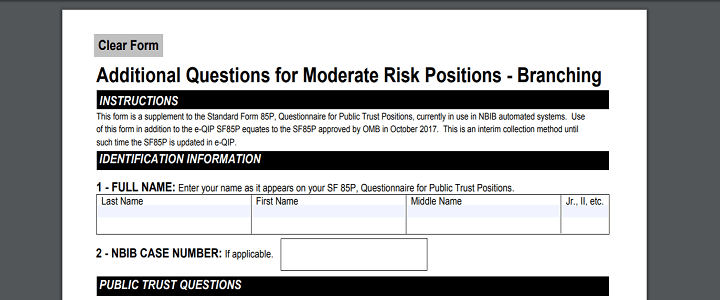We talk often about how lying on the SF-86 is one of the top reasons for security clearance denial and revocation. The problem actually goes both ways, however, and this week a former background investigator who worked for the Office of Personnel Management under the National Background Investigations Bureau pled guilty to falsifying the information provided in background investigation reports.
Lucia Rose DiEmidio, a contract investigator, falsified information about 26 times, stating she had interviewed a source or reviewed a record when she had not. She submitted the records forward, and through the quality control program of NBIB and now the Defense Counterintelligence and Security Agency, the falsifications were discovered. DCSA has had to go back and rework the investigations involved, at an estimated cost of at least $85,562, according to the Department of Justice report.
DiEmidio is one of approximately 30 background investigators who have been prosecuted for falsifying information since 2008. Which goes to show the consequences for lying to the government are high for both those applying for a security clearance, and for those conducting the investigations. DiEmidio will be sentenced in June and faces up to five years in prison and a fine up to $250,000.
The background investigation mission has had its share of controversy. In 2014 the Office of Personnel Management was hacked by China, resulting in a tidal wave of sensitive data for more than 20 million individuals connected to the personnel security program. Soon after, USIS, the largest background investigation contractor, which conducted investigations for both Edward Snowden and Aaron Alexis, faced serious ‘quantity over quality’ allegations. The hasty removal of USIS from the job then resulted in the massive backlog of pending cases the government has just recently crawled out from under.
We could say the government has learned something from these mistakes (although IT improvements are still a work in progress), and today quality control is one of the most critical aspects of the personnel security mission. It’s not just enough to verify a record or conduct an interview; protocols are in place to ensure information is properly gathered and presented to adjudicators within the Department of Defense Consolidated Adjudications Facility.
Individuals are rarely punished for the lies that show up on the security clearance form – the bar to prove someone deliberately falsified the form versus ‘forgot’ key information is high (not too high to deny the clearance however, where the government has the rules in its favor). Background investigators who choose to cut corners and lie however do not share a similar benefit of the doubt – you simply can’t claim to do work that wasn’t conducted, and doing so doesn’t just have career consequences – it has criminal ones, as well.




